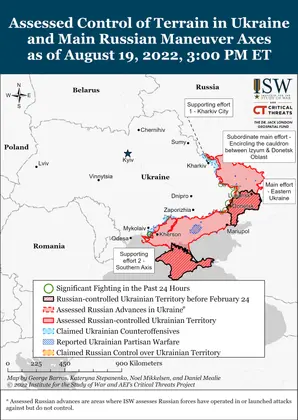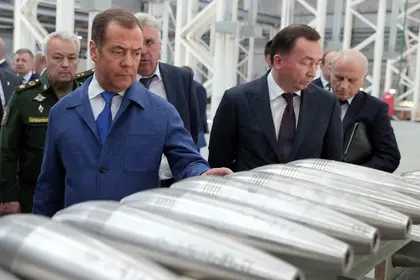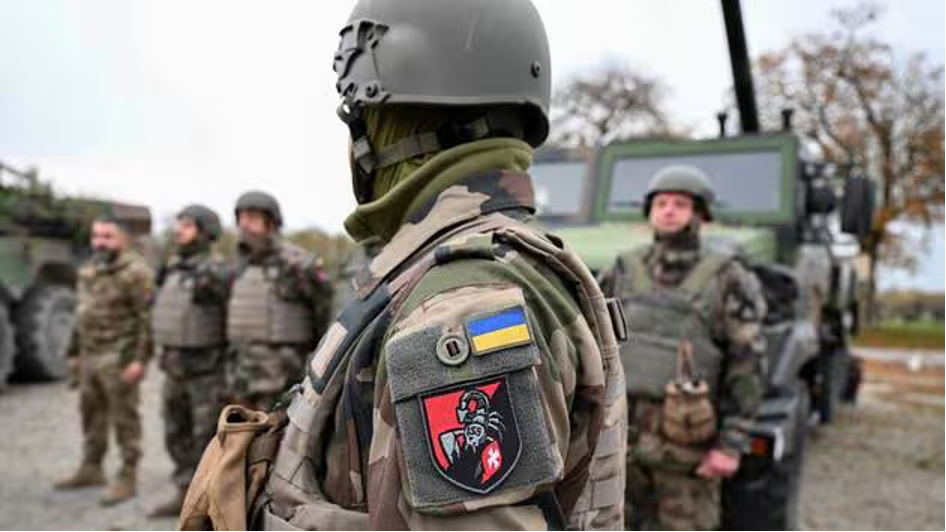Key Takeaways
- Recent Ukrainian strikes on Russian military and transport infrastructure in Crimea and Kherson Oblast are likely reducing Russian confidence in the security of Russian rear areas.
- The situation at the Zaporizhzhia Nuclear Power Plant (ZNPP) remained relatively unchanged on August 19 despite Russian claims that Ukrainian forces would stage a provocation at the plant.
- Russian authorities are likely preparing show trials of Ukrainian defenders of Azovstal on Ukraine’s Independence Day in order to further consolidate occupational control of occupied areas of Ukraine and set conditions to demoralize Ukrainian troops.
- Russian forces conducted limited ground attacks north of Kharkiv City, southwest and southeast of Izyum, east of Siversk, and south and east of Bakhmut.
- Russian forces conducted multiple unsuccessful ground assaults on settlements on the Southern Axis.
- Russia continues to generate regional volunteer units and will likely deploy many of them to Kherson and Ukraine’s south as part of the 3rd Army Corps.
- Russian occupation authorities are strengthening their control of educational infrastructure in occupied areas in preparation for the approaching school year and may be sending Ukrainian children to Russia as part of a broader repopulation campaign.
Recent Ukrainian strikes on Russian military and transportation infrastructure in Crimea and Kherson Oblast are likely reducing Russian confidence in the security of Russian rear areas.
JOIN US ON TELEGRAM
Follow our coverage of the war on the @Kyivpost_official.
Reports from August 18 about Ukrainian strikes are affecting the Russian information space despite the fact that these reports were likely overblown. Available open-source evidence indicates that Ukrainian forces did not conduct a successful kinetic attack against either the Stary Oskol Air Base in Belgorod or Belbek Air Base in Crimea on August 18. Geolocated footage shows that a fire started at a field just south of the Stary Oskol Airfield (rather than at the airfield itself), and satellite imagery shows Russian forces transporting ammunition and military equipment to a forest close to the field. An unspecified Russian Zaporizhia Oblast occupation official reiterated that Russian air defenses near the Kerch Strait Bridge activated against a Ukrainian unmanned aerial vehicle (UAV) rather than an incoming strike. There is no visual evidence of damage to either air base of as August 19. Geolocated footage shows no explosions or evidence of kinetic activity near the Belbek Air Base overnight on August 18-19, lending credence to claims that footage reportedly showing the explosion is recycled footage misattributed to the Belbek Air Base. As ISW reported on August 18, Russian sources largely reported on and disseminated these false or exaggerated reports, indicating broader Russian panic.

North Korea Slams US Criticism Over Troops in Ukraine, Calls It ‘Reckless Provocation’
Russian authorities are visibly increasing security measures in Crimea, indicating growing worry among Russian authorities and civilians about the threat of Ukrainian strikes on rear areas previously believed to be secure. Russian authorities installed checkpoints to search Ukrainian cars and identify saboteurs in Sevastopol. Certain Russian milbloggers made dramatic, pessimistic assessments that Ukrainian forces used strikes on the Kerch Strait Bridge and Belbek Air Base to conduct reconnaissance on Russian air and missile defense readiness and make assessments for new attacks, particularly the feasibility of a large strike. Ukraine’s Center for Strategic Communications (UA StratCom) reported on August 19 that Russian forces are not in control of the situation in Crimea as evidenced by the blocking of the Kerch Strait Bridge and activation of air alarms in Sevastopol for the first time since the start of the invasion. UA StratCom warned that Ukrainian forces have not yet struck the Kerch Strait Bridge with full capabilities and that prior Ukrainian strikes on the bridge demonstrate that the bridge is not as safe as the Russians previously believed.
The situation at the Zaporizhzhia Nuclear Power Plant (ZNPP) remained largely unchanged on August 19, despite the Russian Ministry of Defense’s August 18 claims that Ukrainian forces would stage a provocation at the ZNPP on August 19.
Russian sources claimed that Ukrainian forces shelled the ZNPP at night on August 18-19 but did not claim that Ukrainian forces launched a large-scale attack on the facility, contrary to Russian Ministry of Defense (MoD) statements on August 18. Zaporizhia Oblast Head Oleksandr Starukh emphasized on August 19 that the situation at the ZNPP remains tense but under control.
Ukraine’s Main Intelligence Directorate (GUR) reported that Russian authorities are likely preparing to hold show trials for Ukrainian soldiers in Mariupol around August 24, notably coinciding with Ukraine’s Independence Day.
The GUR warned that Russian authorities intend to hold a show trial of captured fighters from the Azovstal Steel Plant in the Mariupol Philharmonic Theatre and may use the theatre to stage a false-flag attack on August 24. Mariupol Mayor Advisor Petro Andryushchenko confirmed that the Mariupol occupation administration canceled rehearsal schedules at the theatre in order to accommodate the show trials, which ISW previously reported on August 11. As ISW previously reported, these show trials will likely be orchestrated in order to create the impression for Russian domestic audiences that Russian occupation authorities are taking necessary steps to secure occupied areas as well as attempt to demoralize Ukrainian troops. Russian authorities are likely orienting the trials around Ukraine’s Independence Day in order to set further information conditions to exert law enforcement control of occupied areas.
Authors: Karolina Hird, Grace Mappes, Layne Philipson, George Barros, and Frederick W. Kagan.
Read the full report here.
You can also highlight the text and press Ctrl + Enter






